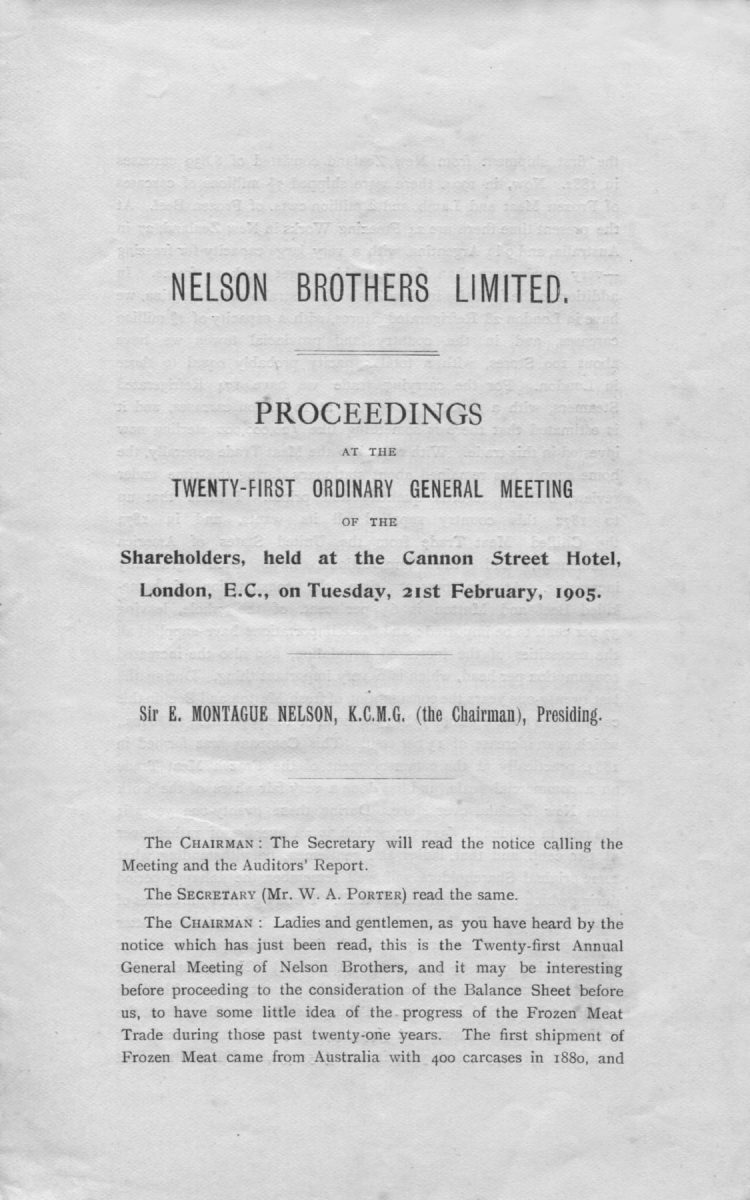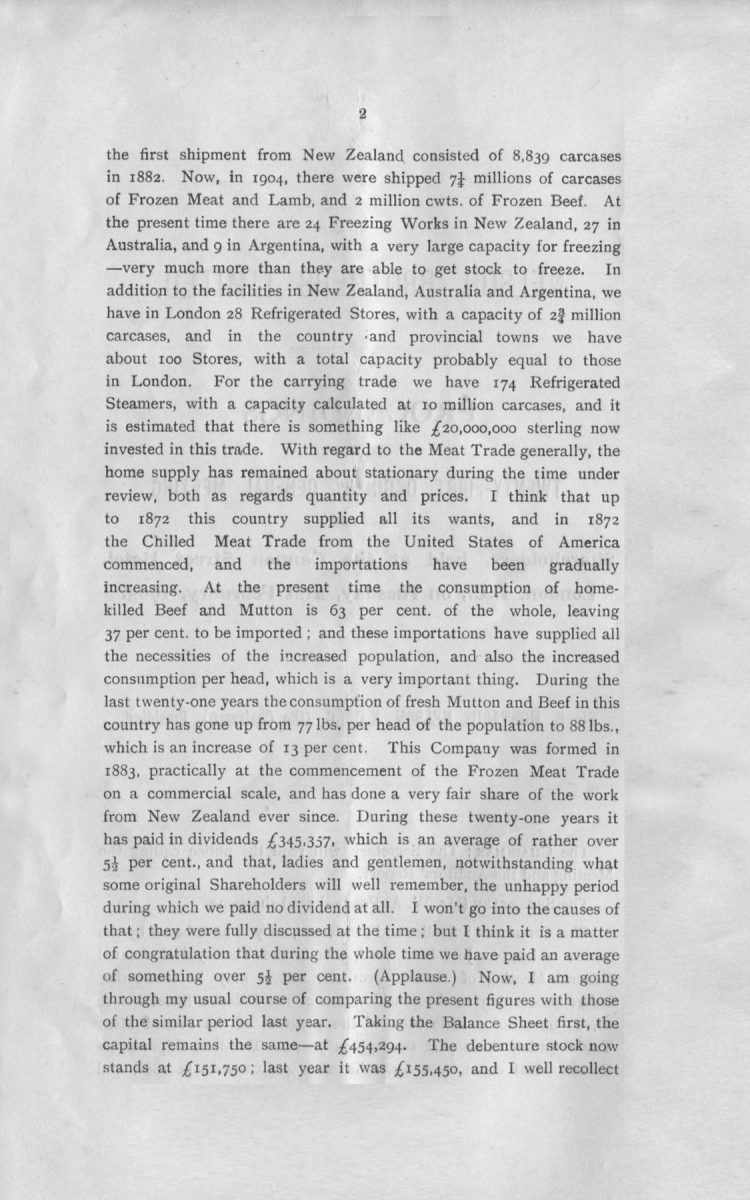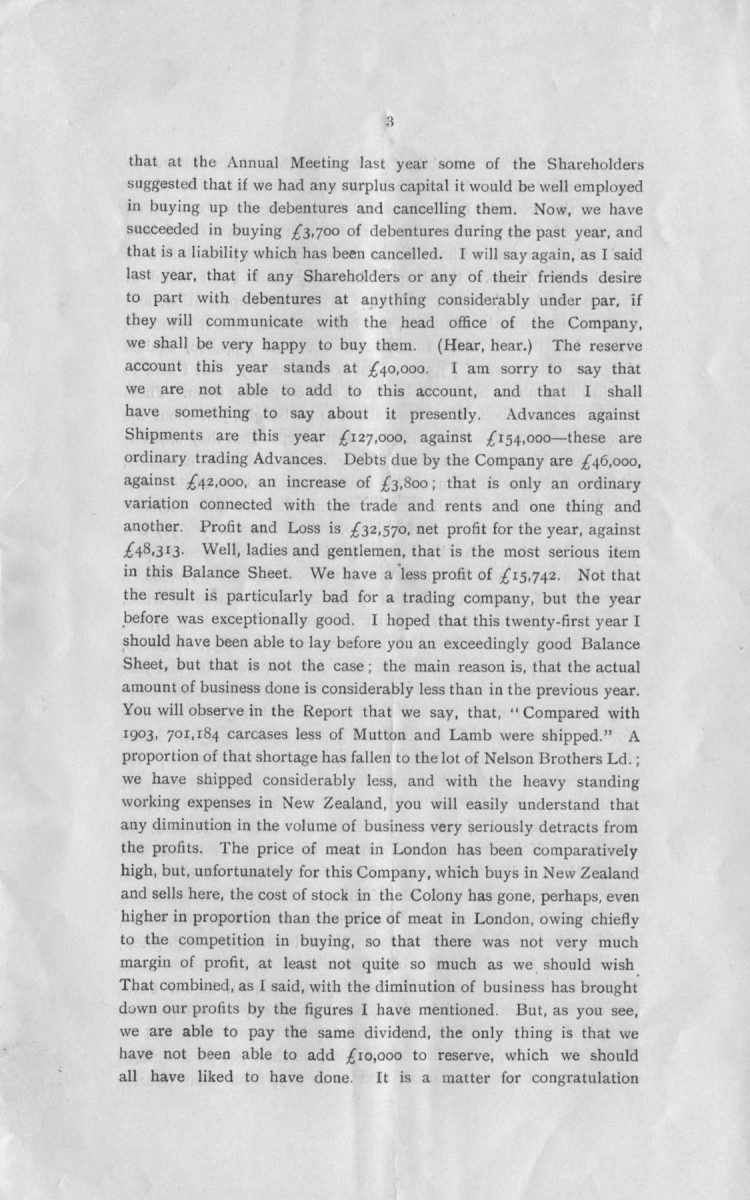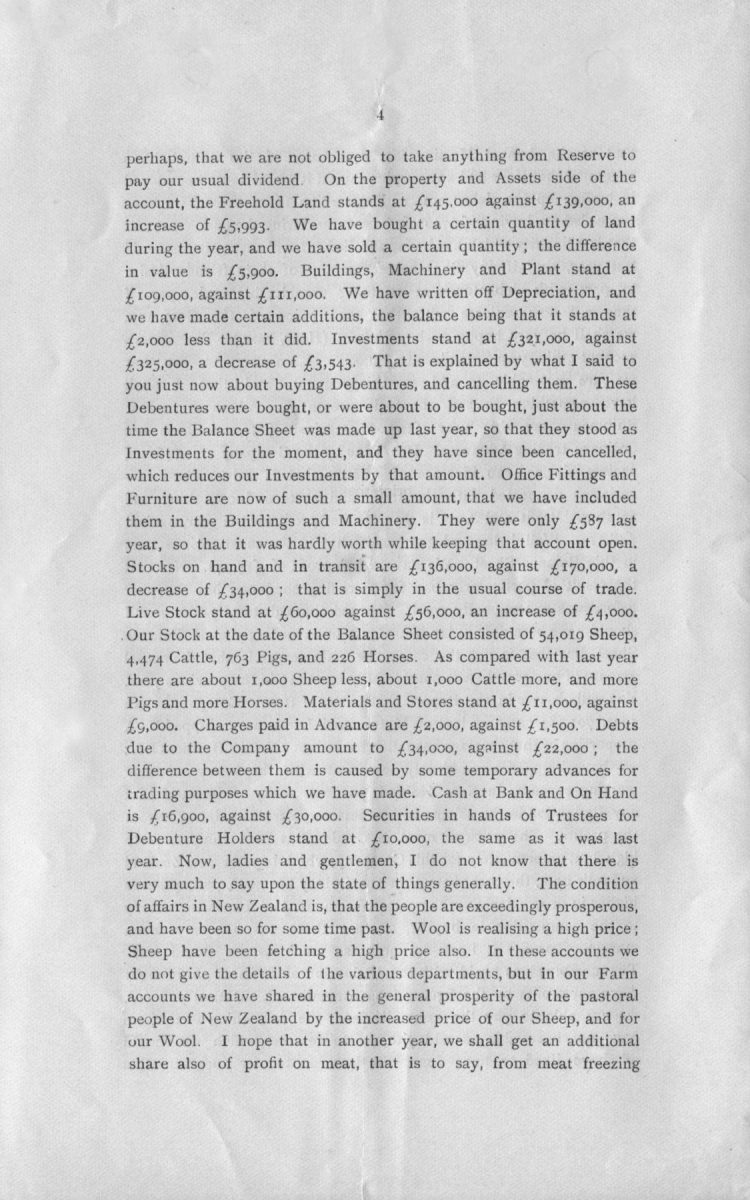- Home
- Collections
- WALMSLEY MJ
- Meat Works
- Nelson Brothers Limited Meeting Report 1905
Nelson Brothers Limited Meeting Report 1905
NELSON BROTHERS LIMITED.
PROCEEDINGS
AT THE
TWENTY-FIRST ORDINARY GENERAL MEETING
OF THE
Shareholders, held at the Cannon Street Hotel, London, E.C., on Tuesday, 21st February, 1905.
Sir E. MONTAGUE NELSON, K.C.M.G. (the Chairman), Presiding.
The CHAIRMAN: The Secretary will read the notice calling the Meeting and the Auditors’ Report.
The SECRETARY (Mr. W. A. PORTER) read the same.
The CHAIRMAN: Ladies and gentlemen, as you have heard by the notice which has just been read, this is the Twenty-first Annual General Meeting of Nelson Brothers, and it may be interesting before proceeding to the consideration of the Balance Sheet before us, to have some little idea of the progress of the Frozen Meat Trade during those past twenty-one years. The first shipment of Frozen Meat came from Australia with 400 carcases in 1880, and

Page 2
the first shipment from New Zealand consisted of 8,839 carcases in 1882. Now, in 1904, there were shipped 7¼ millions of carcases of Frozen Meat and Lamb, and 2 million cwts. of Frozen Beef. At the present time there are 24 Freezing Works in New Zealand, 27 in Australia, and 9 in Argentina, with a very large capacity for freezing – very much more than they are able to get stock to freeze. In addition to the facilities in New Zealand, Australia and Argentina, we have in London 28 Refrigerated Stores, with a capacity of 2¾ million carcases, and in the country and provincial towns we have about 100 Stores, with a total capacity probably equal to those in London. For the carrying trade we have 174 Refrigerated Steamers, with a capacity calculated at I0 million carcases, and it is estimated that there is something like £20,000,000 sterling now invested in this trade. With regard to the Meat Trade generally, the home supply has remained about stationary during the time under review, both as regards quantity and prices. I think that up to 1872 this country supplied all its wants, and in 1872 the Chilled Meat Trade from the United States of America commenced, and the importations have been gradually increasing. At the present time the consumption of home-killed Beef and Mutton is 63 per cent. of the whole, leaving 37 per cent. to be imported; and these importations have supplied all the necessities of the increased population, and also the increased consumption per head, which is a very important thing. During the last twenty-one years the consumption of fresh Mutton and Beef in this country has gone up from 77 lbs. per head of the population to 88 lbs., which is an increase of 13 per cent. This Company was formed in 1883, practically at the commencement of the Frozen Meat Trade on a commercial scale, and has done a very fair share of the work from New Zealand ever since. During these twenty-one years it has paid in dividends £345,357, which is an average of rather over 5½ per cent., and that, ladies and gentlemen, notwithstanding what some original Shareholders will well remember, the unhappy period during which we paid no dividend at all. I won’t go into the causes of that; they were fully discussed at the time; but I think it is a matter of congratulation that during the whole time we have paid an average of something over 5½ per cent. (Applause) Now, I am going through my usual course of comparing the present figures with those of the similar period last year. Taking the Balance Sheet first, the capital remains the same – at £454,294. The debenture stock now stands at £151,750; last year it was £155,450, and I well recollect

Page 3
that at the Annual Meeting last year some of the Shareholders suggested that if we had any surplus capital it would be well employed in buying up the debentures and cancelling them. Now, we have succeeded in buying £3,700 of debentures during the past year, and that is a liability which has been cancelled. I will say again, as I said last year, that if any Shareholders or any of their friends desire to part with debentures at anything considerably under par, if they will communicate with the head office of the Company, we shall be very happy to buy them. (Hear, hear.) The reserve account this year stands at £40,000. I am sorry to say that we are not able to add to this account, and that I shall have something to say about it presently. Advances against Shipments are this year £127,000, against £154,000 – these are ordinary trading Advances. Debts due by the Company are £46,000, against £42,000, an increase of £3,800; that is only an ordinary variation connected with the trade and rents and one thing and another. Profit and Loss is £32,570, net profit for the year, against £48,313. Well, ladies and gentlemen, that is the most serious item in this Balance Sheet. We have a less profit of £15,742. Not that the result is particularly bad for a trading company, but the year before was exceptionally good. I hoped that this twenty-first year I should have been able to lay before you an exceedingly good Balance Sheet, but that is not the case; the main reason is, that the actual amount of business done is considerably less than in the previous year. You will observe in the Report that we say, that, “ Compared with 1903, 701,184 carcases less of Mutton and Lamb were shipped.” A proportion of that shortage has fallen to the lot of Nelson Brothers Ltd.; we have shipped considerably less, and with the heavy standing working expenses in New Zealand, you will easily understand that any diminution in the volume of business very seriously detracts from the profits. The price of meat in London has been comparatively high, but, unfortunately for this Company, which buys in New Zealand and sells here, the cost of stock in the Colony has gone, perhaps, even higher in proportion than the price of meat in London, owing chiefly to the competition in buying, so that there was not very much margin of profit, at least not quite so much as we should wish. That combined, as I said, with the diminution of business has brought down our profits by the figures I have mentioned. But, as you see, we are able to pay the same dividend, the only thing is that we have not been able to add £10,000 to reserve, which we should all have liked to have done. It is a matter for congratulation

Page 4
perhaps, that we are not obliged to take anything from Reserve to pay our usual dividend. On the property and Assets side of the account, the Freehold Land stands at £145,000 against £139,000, an increase of £5,993. We have bought a certain quantity of land during the year, and we have sold a certain quantity; the difference in value is £5,900. Buildings, Machinery and Plant stand at £109,000, against £111,000. We have written off Depreciation, and we have made certain additions, the balance being that it stands at £2,000 less than it did. Investments stand at £321,000, against £325,000, a decrease of £3,543. That is explained by what I said to you just now about buying Debentures, and cancelling them. These Debentures were bought, or were about to be bought, just about the time the Balance Sheet was made up last year, so that they stood as Investments for the moment, and they have since been cancelled, which reduces our Investments by that amount. Office Fittings and Furniture are now of such a small amount, that we have included them in the Buildings and Machinery. They were only £587 last year, so that it was hardly worth while keeping that account open. Stocks on hand and in transit are £136,000, against £170,000, a decrease of £34,000; that is simply in the usual course of trade. Live Stock stand at £60,000 against £56,000, an increase of £4,000. Our Stock at the date of the Balance Sheet consisted of 54,019 Sheep, 4,474 Cattle, 763 Pigs, and 226 Horses. As compared with last year there are about 1,000 Sheep less, about 1,000 Cattle more, and more Pigs and more Horses. Materials and Stores stand at £11,000, against £9,000. Charges paid in Advance are £2,000, against £1,500. Debts due to the Company amount to £34,000, against £22,000; the difference between them is caused by some temporary advances for trading purposes which we have made. Cash at Bank and On Hand is £16,900, against £30,000. Securities in hands of Trustees for Debenture Holders stand at £10,000, the same as it was last year. Now, ladies and gentlemen, I do not know that there is very much to say upon the state of things generally. The condition of affairs in New Zealand is, that the people are exceedingly prosperous, and have been so for some time past. Wool is realising a high price; Sheep have been fetching a high price also. In these accounts we do not give the details of the various departments, but in our Farm accounts we have shared in the general prosperity of the pastoral people of New Zealand by the increased price of our Sheep, and for our Wool. I hope that in another year, we shall get an additional share also of profit on meat, that is to say, from meat freezing

Page 5
and meat selling, which, as I have already explained, have been considerably diminished this year compared with the previous year. The competition in buying increases from year to year, whilst consignments are growing less, and most farmers in New Zealand now sell their Sheep either to the freezing companies, or to the Meat Speculators. As a matter of principle and trade, it is better that the meat should be concentrated in a few hands rather than shipped on owners’ account to many consignees here, I think there is very little doubt about this, and as time goes on we hope some connection between supply and demand may be established. With regard to New Zealand I regret to say that the number of Sheep have diminished by something like three millions during the last two or three years from various causes, and there does not seem much chance of the supply increasing at present. One cause of this is the increase in dairy farms; a great many people have gone in for making butter, and in addition to that, the extra price that farmers have been able to obtain for their Lambs has induced them to ship an enormous quantity compared with previous years, and that it is obvious must reduce the number of Sheep. But the price of Frozen Meat here in London does not entirely depend upon the shipments from New Zealand alone, it is the general supply that regulates the price. We have South America to compete with, and in the near future we shall also have Australia again in the market. Australia, as you know, up to a year ago, has been suffering from serious droughts during the previous ten years. The face of the country now is changed; the Sheep and Cattle have already commenced to increase, and we have had small shipments of a few hundred thousand carcases of Mutton and a similar quantity of Lambs during the past few months from Australia. But in another year, and year by year, if they have favourable seasons, these shipments will increase, no doubt, very rapidly, and then we shall have, what many people in this country would doubtless like to see, namely, very cheap meat. There is no doubt about it, that the supply is likely to exceed the demand, and we only hope that trade will improve in this country, so that the buying powers of the people may be sufficient to absorb all that will probably be sent them. I do not think there is anything more I can say, and I will move the usual resolution: “That the Report and Accounts be” received and adopted, and that a Dividend of 3 per cent. be declared “on the Preference Shares, making 6 per cent. for the year, and of “4 per cent. on the Ordinary Shares, free of Income Tax, making “ 7 per cent. for the year.” (Applause)

Page 6
Mr. W. J. TAYLOR: Ladies and gentlemen, in rising to second the proposition which you have just heard, I feel that, somehow or another, the duty of a seconder, in the case of these meetings, is to try to enlighten you upon any point which might be missed; but you know that our worthy Chairman is so clear, that I think that I could hardly do better than borrow the language of a noble lord in the opening Debate of this Session of the House of Commons, and say that “ I understand our Chairman, and consider I have intelligence enough to believe you understand him also.” Therefore, I think it would be almost a waste of words to say more. I will let you into a little secret of the Board in reference to our Manager in New Zealand. He thinks the Board here are not enthusiastic enough over this year’s accounts, and I gather from what he says, that he would like us to have a week-end ticket to New Zealand, so that we might go there and see the difficulties he has had to contend with, when we would very much more appreciate the Report we have placed before us to-day. Through his advice, and after further consideration, we have come to the conclusion that it is a very good one. I think we are getting into the plan of doing better for you year by year, and we had hoped on this, the twenty-first anniversary of our birth, we should do still better. It was, therefore, a little disappointing to think we could not do so, but after reading the remarks of Mr. William Nelson, who always looks at things in a calm and dispassionate manner, we have come to the conclusion that it is a very satisfactory Report, and we hope you will consider it also in that light. I have great pleasure in seconding the resolution. (Applause)
The CHAIRMAN: I shall be happy to answer any questions that any Shareholder may desire to put to me. If there are no questions, I will put the resolution to the meeting.
The motion was then put, and carried unanimously.
The CHAIRMAN : The retiring Director this year is Mr. J. W. Margetts, and I have great pleasure in proposing that he be re-elected.
Mr. CALKIN LEWIS: I beg to second that proposition. The motion was carried unanimously.
The CHAIRMAN : Would some Shareholder from the other side of the table kindly propose the re-election of the Auditors. Messrs. Chatteris, Nichols & Co.
Mr. RHODES COBB: I have much pleasure in proposing the

Page 7
re-election of Messrs. Chatteris, Nichols and Co., as Auditors, at the usual remuneration of 100 guineas.
Mr. E. H. WILKINSON : I have much pleasure in seconding that.
This resolution was also agreed to.
The CHAIRMAN: That is all the business, ladies and gentlemen.
Mr. TAYLOR: If you will allow me, Mr. Chairman, I should like to make the usual proposition to send out our thanks to Mr. William Nelson and the New Zealand staff, for the care they have taken of our interests during the last twelve months. (Applause)
Mr. EVANS: I will second that, and I would join with it, if you will allow me, a vote of thanks to the Chairman. I think that has been forgotten. He has made out a fair statement, but I think it is even better than he has made out. I find the Consols are written down, and I think that is as good as adding £1,000 to reserve. (Hear, hear.) I always like to see profits divided; I do not want too much reserve for my grandchildren – in fact, I have not got any. I am not at all dissatisfied that we are getting the 7 per cent., but if you could make it 7½ per cent., it is not too much for a fluctuating business. However, I am not grumbling, Sir Montague.
Mr. CALKIN LEWIS: I will second that, and might I suggest that you include the other Directors with the Chairman. (Hear, hear.)
The resolution was then put and very cordially received.
The CHAIRMAN : It is a great satisfaction to me to know that you are not dissatisfied with the result. As I said before, I had hoped it might be better, but still the Directors have done their best. I should like to add something to what Mr. Taylor has said, because we on this side, although we give a close attention to the business here, depend very much on the work on the other side. A great deal depends on the General Manager and staff there under his control. Of course, we hear from him every mail, and we know the difficulties under which he labours. I think I have made the remark before, but I may make it again – that it is a very difficult thing for a man twelve thousand miles away to make purchases of sheep, to be sold six or eight months after he has bought them at a price of which he is unable to form any opinion as to what they are likely to realise. It is a case of considerable anxiety, and not only anxiety, but the result must be that occasionally money must be lost on the purchase, and occasionally,

Page 8
and I hope more often, money will be made by it, so that the balance should be in our favour. There is one point which I omitted when I was taking you just now through these figures, and as it bears on the London work I may mention it. It is that the London expenses amount to £3,128, against £4,749. That is a considerable decrease in the London expenses, and is caused mainly by the reduction in income tax, and to some extent also, I regret to say, by the loss of our late Director, Mr. Abraham Scott. Having made that little addition to what I said before, I beg to heartily thank you, ladies and gentlemen, for the very kind vote of thanks which you have passed. (Applause)
The proceedings then terminated.

Non-commercial use

This work is licensed under a Attribution-NonCommercial 3.0 New Zealand (CC BY-NC 3.0 NZ).
Commercial Use
Please contact us for information about using this material commercially.Can you help?
The Hawke's Bay Knowledge Bank relies on donations to make this material available. Please consider making a donation towards preserving our local history.
Visit our donations page for more information.
Subjects
Format of the original
LeafletDate published
1905People
- Rhodes Cobb
- Calkin Lewis
- Sir E Montague Nelson
- W A Porter
- Abraham Scott
- W J Taylor
- E H Wilkinson










Do you know something about this record?
Please note we cannot verify the accuracy of any information posted by the community.